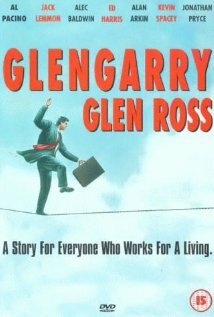Despite being released in 1992, James Foley’s stage-adapted workplace drama Glengarry Glen Ross has more relevance now than it ever could have during the 90s.
In the wake of the global financial crisis, profitability is now synonymous with mass redundancy. For proof, you need only look toward the national unemployment rate in the US, which has almost doubled since the end of the 20th century. You have a family to support? They don’t care. You’re in debt? They don’t care. To the fat cats upstairs, you’re just another lowly statistic waiting to be marginalised for the sake of a strong quarter.
It’s this brutal yet honest admission that sits central to Glengarry Glen Ross; a moving and thoroughly engrossing film written with snappy, narcissistic dialogue by David Mamet.
The film follows four salesmen — Shelly (Jack Lemmon), Ricky (Al Pacino), Dave (Ed Harris) and George (Alan Arkin) — each of whom is more depressing than the next. Times are tough in Chicago and the real estate business is feeling the pinch (is it ever really doing well?). In an attempt to increase profits, big-headed sales strategist Blake (Alec Baldwin) offers the salesmen a double-edged incentive: if they can rake in a certain amount of money by the end of the month, they will win a Cadillac. If not? Well, they’re out of a job. This proposition causes frustration amongst the salesmen, who feel they’re being treated unfairly — which, obviously, they are — and as the pressure becomes unbearable, two of them lash out in a startling way.
It’s hard to blame them. Hell, when a salesman last called your home, what did you do? I suspect you didn’t buy what they were offering, or have a nice chat with them on the rise and fall of our health care system. You probably just hung up the phone. That’s just the natural reaction for most of us. It’s not that we dislike the people on the other end of the telephone; we just tend not to respect the intrusive nature of their job.
It is widely accepted that most adaptations rarely live up to the precedence of the original, yet considering the exceptional quality of Foley’s film, I can only imagine how great Mamet’s original play must have been. Unlike many conversions from stage to screen, Glengarry Glen Ross never feels as though it has been forcibly stretched to suit the big screen. It don’t merely work on film, it belongs.
Whilst filming, it has been said that the actors would sacrifice their days off in order to watch their colleagues perform. Such dedication to the film shows as every situation, every scene feels genuine. If I didn’t know any better, I would have believed Jack Lemmon, Ed Harris, Alan Arkin and Al Pacino each quit acting and became actual salesmen. You get lost in the characters, but more importantly, you get lost in the film. From first frame to last, Glengarry Glen Ross is 100 minutes of sheer unflinching brilliance.
—
Sam Fragoso is a web-based film journalist who writes at dukeandthemovies.com.
![Glengarry Glen Ross [1992] (Retro Review)](/wp-content/uploads/glengarry_glen_ross-21-e1308035197187-700x381.jpg)


![Lolita [1962] (Review) Lolita [1962] (Review)](/wp-content/uploads/lolita-011-e1310700314319-150x150.jpg)
![Rear Window [1954] (Review) Rear Window [1954] (Review)](/wp-content/uploads/rear-window-original1-150x150.jpg)










